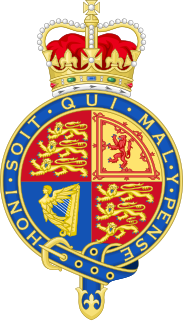Related Research Articles

A trust is a legal relationship in which the holder of a right gives it to another person or entity who must keep and use it solely for another's benefit. In Anglo-American common law, the party who entrusts the right is known as the "settlor", the party to whom the right is entrusted is known as the "trustee", the party for whose benefit the property is entrusted is known as the "beneficiary", and the entrusted property itself is known as the "corpus" or "trust property". With the strategic and legal use of Trusts, individuals can ensure that their children and grandchildren or chosen beneficiaries are able to benefit completely from the inheritance they want them to receive.

Trustee is a legal term which, in its broadest sense, is a synonym for anyone in a position of trust and so can refer to any person who holds property, authority, or a position of trust or responsibility to transfer the title of ownership to the person named as the new owner, in a trust instrument, called a beneficiary. A trustee can also refer to a person who is allowed to do certain tasks but not able to gain income, although that is untrue. Although in the strictest sense of the term a trustee is the holder of property on behalf of a beneficiary, the more expansive sense encompasses persons who serve, for example, on the board of trustees of an institution that operates for a charity, for the benefit of the general public, or a person in the local government.

The doctrine of privity of contract is a common law principle which provides that a contract cannot confer rights or impose obligations upon any person who is not a party to the contract.

A constructive trust is an equitable remedy imposed by a court to benefit a party that has been wrongfully deprived of its rights due to either a person obtaining or holding a legal property right which they should not possess due to unjust enrichment or interference, or due to a breach of fiduciary duty, which is intercausative with unjust enrichment and/or property interference. It is a type of implied trust.

The Hague Convention on the Law Applicable to Trusts and on their Recognition, or Hague Trust Convention is a multilateral treaty developed by the Hague Conference on Private International Law on the Law Applicable to Trusts. It concluded on 1 July 1985, entered into force 1 January 1992, and is as of September 2017 ratified by 14 countries. The Convention uses a harmonised definition of a trust, which is the subject of the convention, and sets Conflict rules for resolving problems in the choice of the applicable law. The key provisions of the Convention are:

A discretionary trust, in the trust law of England, Australia, Canada and other common law jurisdictions, is a trust where the beneficiaries and/or their entitlements to the trust fund are not fixed, but are determined by the criteria set out in the trust instrument by the settlor. It is sometimes referred to as a family trust in Australia or New Zealand. Where the discretionary trust is a testamentary trust, it is common for the settlor to leave a letter of wishes for the trustees to guide them as to the settlor's wishes in the exercise of their discretion. Letters of wishes are not legally binding documents.
In trust law, a beneficiary or cestui que use, a.k.a. cestui que trust, is the person or persons who are entitled to the benefit of any trust arrangement. A beneficiary will normally be a natural person, but it is perfectly possible to have a company as the beneficiary of a trust, and this often happens in sophisticated commercial transaction structures. With the exception of charitable trusts, and some specific anomalous non-charitable purpose trusts, all trusts are required to have ascertainable beneficiaries.

United States trust law is the body of law regulating the legal instrument for holding wealth known as a trust.
Australian trust law is the law of trusts as it is applied in Australia. It is derived from, and largely continues to follow English trust law, as modified by state and federal legislation. A number of unique features of Australian trust law arise from interactions with the Australian systems of company law, family law and taxation.

English trust law concerns the protection of assets, usually when they are held by one party for another's benefit. Trusts were a creation of the English law of property and obligations, and share a subsequent history with countries across the Commonwealth and the United States. Trusts developed when claimants in property disputes were dissatisfied with the common law courts and petitioned the King for a just and equitable result. On the King's behalf, the Lord Chancellor developed a parallel justice system in the Court of Chancery, commonly referred as equity. Historically, trusts have mostly been used where people have left money in a will, or created family settlements, charities, or some types of business venture. After the Judicature Act 1873, England's courts of equity and common law were merged, and equitable principles took precedence. Today, trusts play an important role in financial investment, especially in unit trusts and in pension trusts. Although people are generally free to set the terms of trusts in any way they like, there is growing legislation to protect beneficiaries or regulate the trust relationship, including the Trustee Act 1925, Trustee Investments Act 1961, Recognition of Trusts Act 1987, Financial Services and Markets Act 2000, Trustee Act 2000, Pensions Act 1995, Pensions Act 2004 and Charities Act 2011.

The three certainties refer to a rule within English trusts law on the creation of express trusts that, to be valid, the trust instrument must show certainty of intention, subject matter and object. "Certainty of intention" means that it must be clear that the donor or testator wishes to create a trust; this is not dependent on any particular language used, and a trust can be created without the word "trust" being used, or even the donor knowing he is creating a trust. Since the 1950s, the courts have been more willing to conclude that there was intention to create a trust, rather than hold that the trust is void. "Certainty of subject matter" means that it must be clear what property is part of the trust. Historically the property must have been segregated from non-trust property; more recently, the courts have drawn a line between tangible and intangible assets, holding that with intangible assets there is not always a need for segregation. "Certainty of objects" means that it must be clear who the beneficiaries, or objects, are. The test for determining this differs depending on the type of trust; it can be that all beneficiaries must be individually identified, or that the trustees must be able to say with certainty, if a claimant comes before them, whether he is or is not a beneficiary.

An equitable interest is an "interest held by virtue of an equitable title or claimed on equitable grounds, such as the interest held by a trust beneficiary". The equitable interest is a right in equity that may be protected by an equitable remedy. This concept exists only in systems influenced by the common law tradition, such as New Zealand, England, Canada, Australia, and the United States.

Boardman v Phipps [1966] UKHL 2 is a landmark English trusts law case concerning the duty of loyalty and the duty to avoid conflicts of interest.

The Trustee Act 2000 is an Act of the Parliament of the United Kingdom that regulates the duties of trustees in English trust law. Reform in these areas had been advised as early as 1982, and finally came about through the Trustee Bill 2000, based on the Law Commission's 1999 report "Trustees' Powers and Duties", which was introduced to the House of Lords in January 2000. The bill received the Royal Assent on 23 November 2000 and came into force on 1 February 2001 through the Trustee Act 2000 (Commencement) Order 2001, a Statutory Instrument, with the Act having effect over England and Wales.

Schmidt v Rosewood Trust Ltd[2003] UKPC 26 is a judicial decision concerning the information rights of a beneficiary under a discretionary trust. Although the judgment involved a question as to the law of the Isle of Man, the Privy Council's judgment in Schmidt v Rosewood was adopted into English law by Briggs J in Breakspear v Ackland[2008] EWHC 220 (Ch).
The creation of express trusts in English law must involve four elements for the trust to be valid: capacity, certainty, constitution and formality. Capacity refers to the settlor's ability to create a trust in the first place; generally speaking, anyone capable of holding property can create a trust. There are exceptions for statutory bodies and corporations, and minors who usually cannot hold property can, in some circumstances, create trusts. Certainty refers to the three certainties required for a trust to be valid. The trust instrument must show certainty of intention to create a trust, certainty of what the subject matter of the trust is, and certainty of who the beneficiaries are. Where there is uncertainty for whatever reason, the trust will fail, although the courts have developed ways around this. Constitution means that for the trust to be valid, the property must have been transferred from the settlor to the trustees.
Constructive trusts in English law are a form of trust created by the English law courts primarily where the defendant has dealt with property in an "unconscionable manner"—but also in other circumstances. The property is held in "constructive trust" for the harmed party, obliging the defendant to look after it. The main factors that lead to a constructive trust are unconscionable dealings with property, profits from unlawful acts, and unauthorised profits by a fiduciary. Where the owner of a property deals with it in a way that denies or impedes the rights of some other person over that property, the courts may order that owner to hold it in constructive trust. Where someone profits from unlawful acts, such as murder, fraud, or bribery, these profits may also be held in constructive trust. The most common of these is bribery, which requires that the person be in a fiduciary office. Certain offices, such as those of trustee and company director, are always fiduciary offices. Courts may recognise others where the circumstances demand it. Where someone in a fiduciary office makes profits from their duties without the authorisation of that office's beneficiaries, a constructive trust may be imposed on those profits; there is a defence where the beneficiaries have authorised such profits. The justification here is that a person in such an office must avoid conflicts of interest, and be held to account should he fail to do so.

The Attorney General for Hong Kong v Reid (UKPC)[1993] UKPC 2 was a New Zealand-originated trust law case heard and decided by the Judicial Committee of the Privy Council, where it was held that bribe money accepted by a person in a position of trust, can be traced into any property bought and is held on constructive trust for the beneficiary.

Binions v Evans[1972] EWCA Civ 6 is an English land law and English trusts law case, concerning a constructive trust of land which will often be irrevocable whilst the occupier is in occupation as opposed to a licence to occupy — and/or a tenancy at will which is similar save that without transfer of the underlying property it can be revoked without cause. The case hinged on the fact there was an agreement specifying the existing occupier was to remain.

AIB Group (UK) plc v Mark Redler & Co Solicitors [2014] UKSC 58 is an English trust law case, concerning the applicable principles of causation for a breach of trust. It held that a "but for" test of causation applies for equitable compensation.